新概念英语自主学习练习题
- 格式:doc
- 大小:630.50 KB
- 文档页数:21
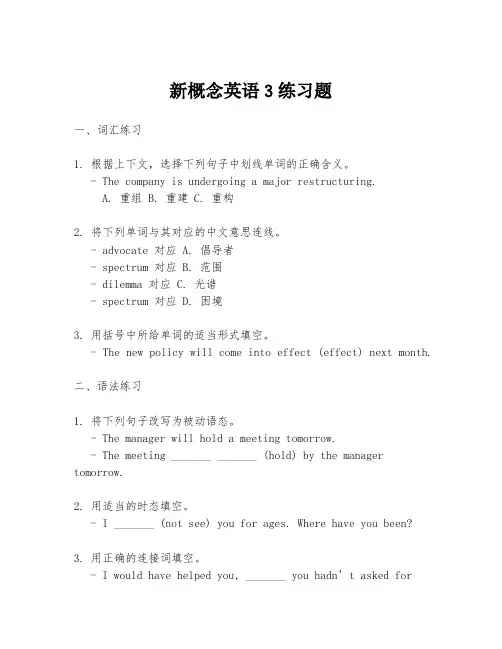
新概念英语3练习题一、词汇练习1. 根据上下文,选择下列句子中划线单词的正确含义。
- The company is undergoing a major restructuring.A. 重组B. 重建C. 重构2. 将下列单词与其对应的中文意思连线。
- advocate 对应 A. 倡导者- spectrum 对应 B. 范围- dilemma 对应 C. 光谱- spectrum 对应 D. 困境3. 用括号中所给单词的适当形式填空。
- The new policy will come into effect (effect) next month.二、语法练习1. 将下列句子改写为被动语态。
- The manager will hold a meeting tomorrow.- The meeting _______ _______ (hold) by the manager tomorrow.2. 用适当的时态填空。
- I _______ (not see) you for ages. Where have you been?3. 用正确的连接词填空。
- I would have helped you, _______ you hadn’t asked forit.三、阅读理解阅读下面的短文,然后回答问题。
Tom was a young man who loved to travel. One day, he decided to visit a small village in the mountains. The village was very peaceful and the air was fresh. Tom enjoyed his time there and made many friends. He learned about the local customs and tried the traditional food. When it was time to leave, he promised to come back.1. Why did Tom decide to visit the village?2. What did Tom do while he was in the village?3. How did Tom feel about the village?四、写作练习写一篇短文,描述你最近一次旅行的经历。
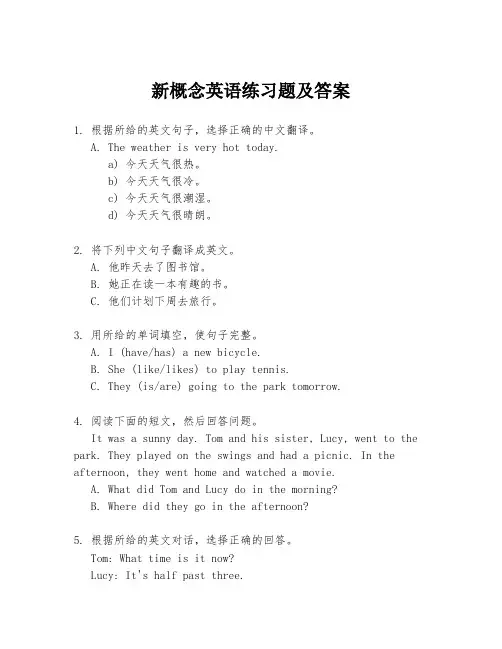
新概念英语练习题及答案1. 根据所给的英文句子,选择正确的中文翻译。
A. The weather is very hot today.a) 今天天气很热。
b) 今天天气很冷。
c) 今天天气很潮湿。
d) 今天天气很晴朗。
2. 将下列中文句子翻译成英文。
A. 他昨天去了图书馆。
B. 她正在读一本有趣的书。
C. 他们计划下周去旅行。
3. 用所给的单词填空,使句子完整。
A. I (have/has) a new bicycle.B. She (like/likes) to play tennis.C. They (is/are) going to the park tomorrow.4. 阅读下面的短文,然后回答问题。
It was a sunny day. Tom and his sister, Lucy, went to the park. They played on the swings and had a picnic. In the afternoon, they went home and watched a movie.A. What did Tom and Lucy do in the morning?B. Where did they go in the afternoon?5. 根据所给的英文对话,选择正确的回答。
Tom: What time is it now?Lucy: It's half past three.A. It's 3:00.B. It's 3:30.C. It's 3:45.D. It's 4:00.6. 选择正确的单词填空,完成句子。
A. The (cat/dog) is sleeping on the sofa.B. She (buys/bought) a new dress yesterday.C. They (are/were) at the party last night.7. 根据所给的英文句子,选择正确的中文翻译。
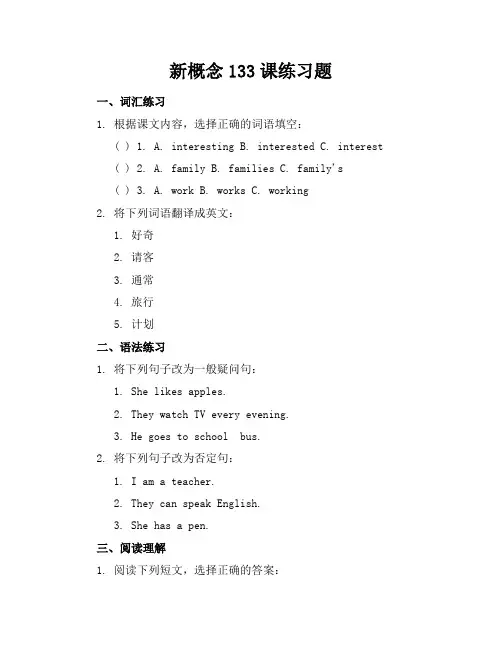
新概念133课练习题一、词汇练习1. 根据课文内容,选择正确的词语填空:( ) 1. A. interesting B. interested C. interest ( ) 2. A. family B. families C. family's( ) 3. A. work B. works C. working2. 将下列词语翻译成英文:1. 好奇2. 请客3. 通常4. 旅行5. 计划二、语法练习1. 将下列句子改为一般疑问句:1. She likes apples.2. They watch TV every evening.3. He goes to school bus.2. 将下列句子改为否定句:1. I am a teacher.2. They can speak English.3. She has a pen.三、阅读理解1. 阅读下列短文,选择正确的答案:Mr. Green lives in a small town. He has a restaurant near the center of the town. The restaurant is not very big, but it is very clean and tidy. Mr. Green works in the restaurant every day. He gets up early in the morning and goes to work. Many people like to eat in his restaurant because the food is delicious and the price is not high.( ) 1. Where does Mr. Green live?A. In a big city.B. In a small town.C. In a village.( ) 2. What does Mr. Green do?A. He is a doctor.B. He is a teacher.C. He is a restaurant owner.( ) 3. Why do many people like to eat in his restaurant?A. Because the food is delicious and the price is high.B. Because the food is delicious and the price is not high.C. Because the restaurant is very big.四、完形填空1. Fill in the blanks with the correct words:My name is Tom. I am a (1) __________ student. I like playing (2) __________ with my friends. We often play (3)__________ after school. My favorite (4) __________ is basketball. I think it is very (5) __________.五、翻译练习1. 将下列句子翻译成中文:1. She goes to the library every weekend.2. My mother is cooking dinner in the kitchen.3. They are watching a movie tonight.2. 将下列句子翻译成英文:1. 他每天早上跑步。
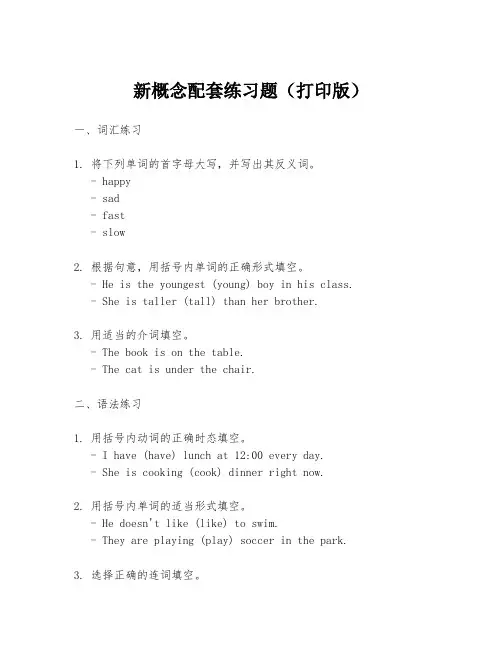
新概念配套练习题(打印版)一、词汇练习1. 将下列单词的首字母大写,并写出其反义词。
- happy- sad- fast- slow2. 根据句意,用括号内单词的正确形式填空。
- He is the youngest (young) boy in his class. - She is taller (tall) than her brother.3. 用适当的介词填空。
- The book is on the table.- The cat is under the chair.二、语法练习1. 用括号内动词的正确时态填空。
- I have (have) lunch at 12:00 every day.- She is cooking (cook) dinner right now.2. 用括号内单词的适当形式填空。
- He doesn't like (like) to swim.- They are playing (play) soccer in the park.3. 选择正确的连词填空。
- She although / though she was tired, she continued to work.- He because / since he was late, he missed the bus.三、阅读理解阅读下面的短文,回答问题。
A Trip to the ZooLast Sunday, we went to the zoo with our family. It was a sunny day and we were excited to see all the animals. We saw lions, elephants, and monkeys. The children loved the monkeys the most because they were very playful. We also saw some beautiful birds and colorful fish in the aquarium. We had a great time and learned a lot about different animals.1. What day did they go to the zoo?- Monday- Tuesday- Sunday2. What animals did they see at the zoo?- Lions, elephants, and monkeys- Tigers, giraffes, and zebras3. Which animals did the children like the most?- Elephants- Monkeys4. What did they see in the aquarium?- Birds and fish- Snakes and turtles四、写作练习请根据以下提示写一篇小短文,描述你上一次去动物园的经历。
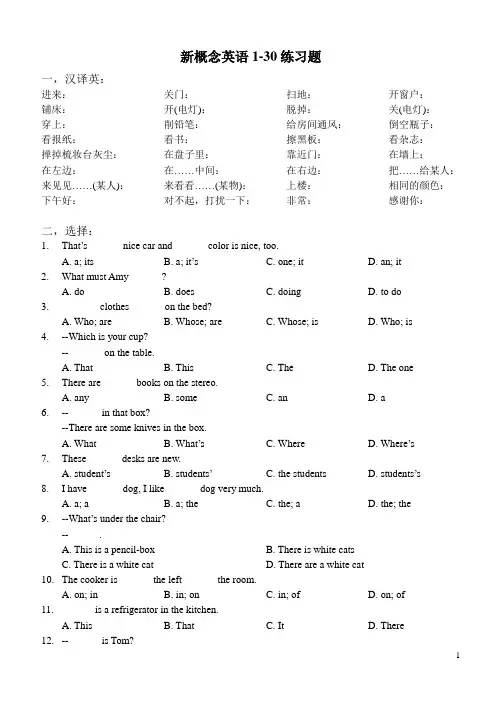
新概念英语1-30练习题一,汉译英:进来:关门:扫地:开窗户:铺床:开(电灯):脱掉:关(电灯):穿上:削铅笔:给房间通风:倒空瓶子:看报纸:看书:擦黑板:看杂志:掸掉梳妆台灰尘:在盘子里:靠近门:在墙上:在左边:在……中间:在右边:把……给某人:来见见……(某人):来看看……(某物):上楼:相同的颜色:下午好:对不起,打扰一下:非常:感谢你:二,选择:1.That’s ______ nice car and ______ color is nice, too.A. a; itsB. a; it’sC. one; itD. an; it2. What must Amy ______?A. doB. doesC. doingD. to do3. _______ clothes ______ on the bed?A. Who; areB. Whose; areC. Whose; isD. Who; is4. --Which is your cup?-- ______ on the table.A. ThatB. ThisC. TheD. The one5. There are ______ books on the stereo.A. anyB. someC. anD. a6. --______ in that box?--There are some knives in the box.A. WhatB. What’sC. WhereD. Where’s7. These ______ desks are new.A. student’sB. students’C. the studentsD. students’s8. I have ______ dog, I like ______ dog very much.A. a; aB. a; theC. the; aD. the; the9. --What’s under the chair?--______.A. This is a pencil-boxB. There is white catsC. There is a white catD. There are a white cat10. The cooker is ______ the left ______ the room.A. on; inB. in; onC. in; ofD. on; of11. ______ is a refrigerator in the kitchen.A. ThisB. ThatC. ItD. There12. --______ is Tom?--He is in the kitchen.A. WhatB. WhereC. WhichD. Who13. --Where is Kate’s chair?--______ in the middle of the classroom.A. She’sB. Her’sC. It’sD. Theirs14. Those are your books. Put ______ on the desk.A. some booksB. theyC. booksD. them15. Give ______ some boxes.A. theyB. theirC. themD. theirs16. --______ the woman?--She is my mother.A. What’sB. Who’sC. Whose isD. Which is17. ______ mother is a teacher of English.A. Lucy’s and LilyB. Lucy and Lily’sC. Lucy’s and Lily’sD. Lucy and Lily18. --Are these your pens?--No, not ______.A. those onesB. thoseC. these onesD. ones19. --______ book is Wang Ping’s?--The one on the shelf.A. WhichB. WhoseC. WhoD. What20. This box is big. That ______ is small.A. oneB. onesC. one’sD. ones’21. Give ______ some glasses.A. meB. IC. myD. mine22. Please come ______ and sit ______.A. on; downB. in; downC. in; upD. up; in23. --______?--We are tired and thirsty.A. What’s matterB. What’s the matterC. What’s a matterD. What’s an matter24. --Are you all right?--No, we ______.A. areB. aren’tC. isD. isn’t25. ______ is Jim’s bike. ______ number is 2398.A. It; It’sB. It; ItsC. It; HisD. Its; It26. What are their ______?A. jobB. jobsC. job’sD. jobs’27. ______ women are very hard-working.A. This isB. ThatC. ThoseD. A28. --Are you Swedish?--______, we are not.A. YesB. NoC. NotD. /29. --Are these your coats?--______.A. No, they are our coatsB. Yes, they areC. Yes, they aren’tD. Yes, I am30. --______ is the new dress?--It’s very smart.A. WhatB. WhoseC. HowD. What color31. --______?--She is a keyboard operator.A. What make is sheB. What nationality is sheC. What colour is sheD. What is her job32. Jim and I are ______ same class.A. inB. in theC. theD. /33. John is ______ American boy.A. theB. aC. anD. /34. We are in ______ grade.A. sameB. a sameC. an sameD. the same35. --How is Mary?--______.A. She’s very wellB. She is Number FiveC. She is KoreanD. She is a nurse36. This isn’t a German car. ______ is a Swedish car.A. HeB. SheC. YouD. It37. Look ______ that girl. So fat!A. atB. aC. theD. /38. Tommy is ______ Italian.A. aB. anC. theD. /39. She is ______ air hostess.A. aB. theC. anD. /40. --What are these?--______.A. They are boxesB. These are boxesC. They are boxesD. These are boys 三,句型转换:1.Amy must put these clothes in the wardrobe. (就划线部分提问)________ ________ Amy ________ these clothes?2.We must make the bed. (就划线部分提问)________ ________ we do?3.Amy must dust the dressing table. (改为否定句)Amy ________ ________ the dressing table.4.He must sweep the floor. (改为一般疑问句)5.You mustn’t clean the refrigerator. (写出同义句)________ ________ the refrigerator.6.You must air the room. (改为祈使句)________ the ________.e in. (改为否定句)________ ________ in.8.There is a cigarette on the dressing table. (写出复数句)There ________ ________ _______ on the dressing table. 9.There are some trousers on the bed. (改为否定句)There ________ ________ trousers on the bed.10.There isn’t an armchair in the living room. (写出复数句)There ________ ________ ________ in the living room. 11.Is there a car near the house? (写出复数句)________ there ________ ________ near the house?12.The blunt knives are on the table. (就划线部分提问)________ ________ are on the table?13.The stereo is near the door. (就划线部分提问)________ is the ________?14.The pictures on the wall are lovely. (就划线部分提问)________ ________ are lovely?15.There are some glasses near those bottles. (改为一般疑问句)________ there ________ glasses near those bottles?16.There are some tickets on the shelf. (就划线部分提问)________ ________ on the shelf?17.Mrs. Smith is in the garden. (就划线部分提问)________ ________ is in the garden?18.The electric cooker is blue. (就划线部分提问)________ ________ is the electric cooker?19.There is a spoon in the cup. (就划线部分提问)________ ________ the spoon?20.There are some forks on the tin. (就划线部分提问)________ ________ ________ are there on the tin?21.There is some milk in the glass. (就划线部分提问)________ ________ ________ is there in the glass?22.Mrs. Smith’s kitchen is small. (就划线部分提问)________ ________ is small?23.There is a bottle on the table. (就划线部分提问)________ ________ on the table?24.Those are our umbrellas. (就划线部分提问)25.The plates on the cupboard are big. (就划线部分提问)_________ ________ are big?26.Give him some ties. (写出同义句)________ some ties ________ him.27.The sharp knife is long. (就划线部分提问)________ knife is ________?28.Please come here. Please meet my friend. (合并句子)Please ________ ________ ________ my friend. 29.These cases are heavy. (就划线部分提问)________ are these ________?30.The coats are grey. (就划线部分提问)________ ________ are the coats?31.The children are tired and thirsty. (就划线部分提问)________ ________ ________ ________ the children?32.The ice cream man is Russian. (就划线部分提问)________ ________ is the ice cream man?33.Jim is an office assistant. (就划线部分提问)________ is Jim’s ________?34.That woman is hard-working. (写出复数句)________ ________ ________ hard-working.35.These girls are Danish. (就划线部分提问)________ _______ are these girls?36.They are keyboard operators. (就划线部分提问)________ are their ________?37.This is Tim’s shirt. (就划线部分提问)________ ________ is this?38.They are passports. (就划线部分提问)________ are ________?39.The car is Ford. (就划线部分提问)________ ________ is the car?40.Are you a teacher? (做出否定回答)________, I ________ ________.四,根据汉译补全句子:1.床上没有任何裤子。
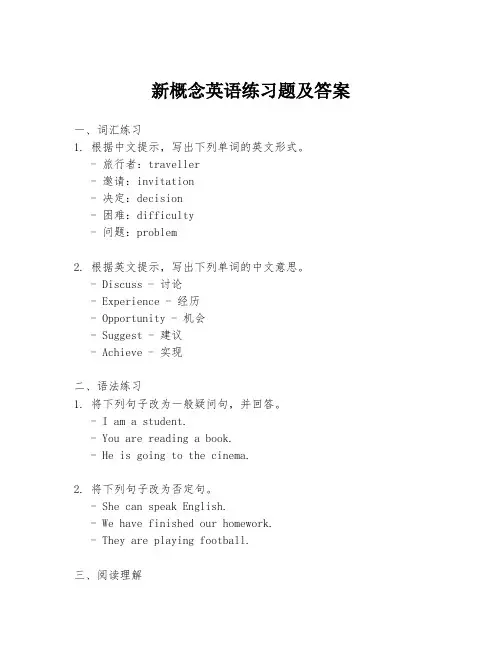
新概念英语练习题及答案一、词汇练习1. 根据中文提示,写出下列单词的英文形式。
- 旅行者:traveller- 邀请:invitation- 决定:decision- 困难:difficulty- 问题:problem2. 根据英文提示,写出下列单词的中文意思。
- Discuss - 讨论- Experience - 经历- Opportunity - 机会- Suggest - 建议- Achieve - 实现二、语法练习1. 将下列句子改为一般疑问句,并回答。
- I am a student.- You are reading a book.- He is going to the cinema.2. 将下列句子改为否定句。
- She can speak English.- We have finished our homework.- They are playing football.三、阅读理解阅读以下短文,并回答下列问题。
Tom is a young man who loves to travel. He has been to many places around the world and has many interesting stories to tell. Last summer, he went to Paris and visited the Eiffel Tower. He also went to London and saw the Big Ben. This year, he plans to go to Australia and see the Sydney Opera House. He is very excited about his upcoming trip.1. Where did Tom visit last summer?2. What is Tom planning to do this year?3. What does Tom love to do?四、完形填空阅读下面的短文,从括号内选出合适的选项填入空白处。
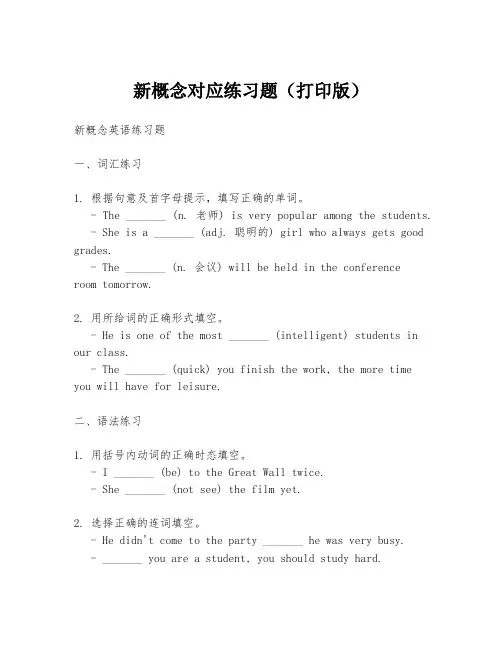
新概念对应练习题(打印版)新概念英语练习题一、词汇练习1. 根据句意及首字母提示,填写正确的单词。
- The _______ (n. 老师) is very popular among the students. - She is a _______ (adj. 聪明的) girl who always gets good grades.- The _______ (n. 会议) will be held in the conferenceroom tomorrow.2. 用所给词的正确形式填空。
- He is one of the most _______ (intelligent) students in our class.- The _______ (quick) you finish the work, the more time you will have for leisure.二、语法练习1. 用括号内动词的正确时态填空。
- I _______ (be) to the Great Wall twice.- She _______ (not see) the film yet.2. 选择正确的连词填空。
- He didn't come to the party _______ he was very busy.- _______ you are a student, you should study hard.三、阅读理解阅读下面的短文,回答问题。
A Trip to the ZooLast Sunday, my family and I went to the zoo. It was a sunny day, and we were all excited to see the animals. We started with the lion enclosure, where we saw two magnificent lions. They were roaring loudly, which was quite impressive. Next, we visited the monkey house, where the monkeys were swinging from branch to branch. The children were fascinated by their playful behavior.After that, we went to see the elephants. They were huge and had long trunks. We watched as they used their trunks to pick up food and water. It was amazing to see how dexterous they were. We also saw many other animals, such as giraffes, zebras, and kangaroos.The highlight of the trip was the bird show. The birds performed various tricks, and the audience was delighted. My favorite part was when a parrot repeated some words in different languages.In conclusion, it was a wonderful day at the zoo. We all learned a lot about the animals and had a great time.Questions:1. What was the weather like on the day of the trip?2. Which animals did the family see at the zoo?3. What was the highlight of their trip?四、写作练习请根据以下提示写一篇短文,描述你理想中的学校生活。
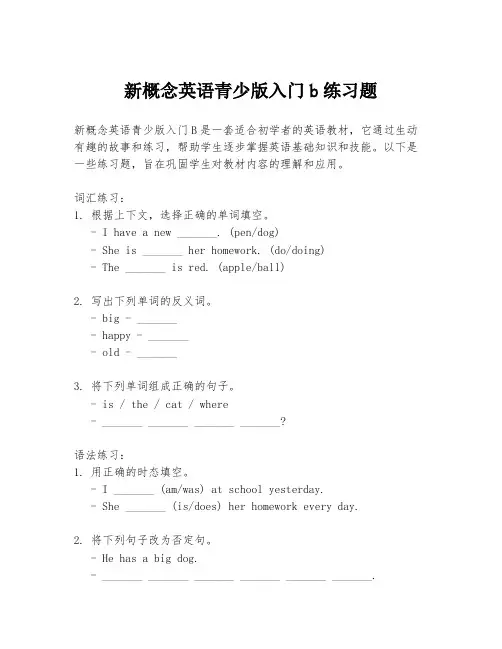
新概念英语青少版入门b练习题新概念英语青少版入门B是一套适合初学者的英语教材,它通过生动有趣的故事和练习,帮助学生逐步掌握英语基础知识和技能。
以下是一些练习题,旨在巩固学生对教材内容的理解和应用。
词汇练习:1. 根据上下文,选择正确的单词填空。
- I have a new _______. (pen/dog)- She is _______ her homework. (do/doing)- The _______ is red. (apple/ball)2. 写出下列单词的反义词。
- big - _______- happy - _______- old - _______3. 将下列单词组成正确的句子。
- is / the / cat / where- _______ _______ _______ _______?语法练习:1. 用正确的时态填空。
- I _______ (am/was) at school yesterday.- She _______ (is/does) her homework every day.2. 将下列句子改为否定句。
- He has a big dog.- _______ _______ _______ _______ _______ _______.3. 用正确的疑问词填空,并将句子变为一般疑问句。
- _______ is your name?- _______ _______ _______ _______ _______?阅读理解:阅读以下短文,回答后面的问题。
Tom is a student. He is ten years old. He has a sister, Lucy. Lucy is eight years old. They both go to the same school. They like to play football after school. Their favorite teacher is Mr. Brown. He teaches them English.1. How old is Tom?2. Who is Lucy?3. What do they like to do after school?4. Who is their favorite teacher?5. What subject does Mr. Brown teach?听力练习:听录音,完成以下任务。
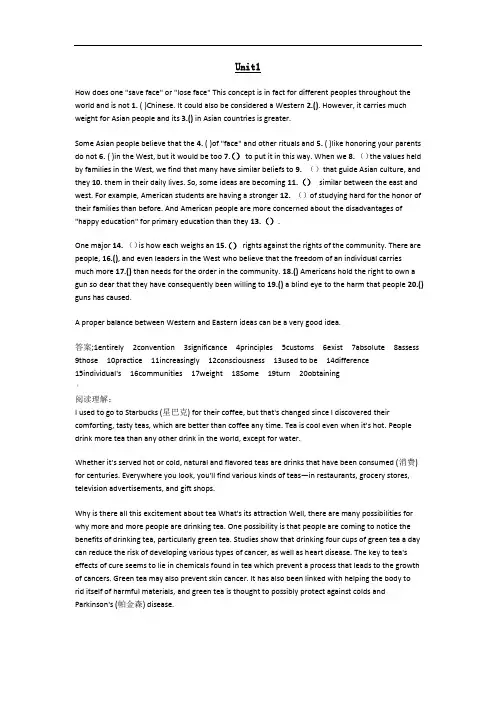
Unit1How does one "save face" or "lose face" This concept is in fact for different peoples throughout the world and is not 1. ( )Chinese. It could also be considered a Western 2.(). However, it carries much weight for Asian people and its 3.() in Asian countries is greater.Some Asian people believe that the 4. ( )of "face" and other rituals and 5. ( )like honoring your parents do not 6. ( )in the West, but it would be too 7.()to put it in this way. When we 8.()the values held by families in the West, we find that many have similar beliefs to 9.()that guide Asian culture, and they 10. them in their daily lives. So, some ideas are becoming 11.()similar between the east and west. For example, American students are having a stronger 12.()of studying hard for the honor of their families than before. And American people are more concerned about the disadvantages of "happy education" for primary education than they 13.().One major 14.()is how each weighs an 15.()rights against the rights of the community. There are people, 16.(), and even leaders in the West who believe that the freedom of an individual carries much more 17.() than needs for the order in the community. 18.() Americans hold the right to own a gun so dear that they have consequently been willing to 19.() a blind eye to the harm that people 20.() guns has caused.A proper balance between Western and Eastern ideas can be a very good idea.答案;1entirely 2convention 3significance 4principles 5customs 6exist 7absolute 8assess 9those 10practice 11increasingly 12consciousness 13used to be 14difference15individual's 16communities 17weight 18Some 19turn 20obtaining(阅读理解:I used to go to Starbucks (星巴克) for their coffee, but that's changed since I discovered their comforting, tasty teas, which are better than coffee any time. Tea is cool even when it's hot. People drink more tea than any other drink in the world, except for water.Whether it's served hot or cold, natural and flavored teas are drinks that have been consumed (消费) for centuries. Everywhere you look, you'll find various kinds of teas―in restaurants, grocery stores, television advertisements, and gift shops.Why is there all this excitement about tea What's its attraction Well, there are many possibilities for why more and more people are drinking tea. One possibility is that people are coming to notice the benefits of drinking tea, particularly green tea. Studies show that drinking four cups of green tea a day can reduce the risk of developing various types of cancer, as well as heart disease. The key to tea's effects of cure seems to lie in chemicals found in tea which prevent a process that leads to the growth of cancers. Green tea may also prevent skin cancer. It has also been linked with helping the body to rid itself of harmful materials, and green tea is thought to possibly protect against colds and Parkinson's (帕金森) disease.Another explanation for why people are drinking more tea may be due to the comforting process of just making a cup of tea. The time it takes to prepare tea leaves in hot water and enjoy its gentle flavor forces drinkers to slow down and relax a while, making it the perfect way to improve a world where people are so crazy about cappuccino(热牛奶咖啡), a hot coffee with milk in it.So, whether you drink tea, eat it in foods, wear it to smell good, or take it in pills, one thing is certain, the use of tea is more than a trend―it is a habit of our past and if studies prove the benefit of its use, it will undoubtedly be an important element of our future.-1.Nowadays, among all the drinks in the world, tea is __________.A. the most widely consumed drinkB. as widespread as coffeeC. even more widely consumed than waterD. the second most widely consumed drink2.The passage does not mention __________ as a possible benefit of drinking tea.A. preventing skin cancerB. helping the body to rid itself of harmful materialC. curing Parkinson's diseaseD. reducing the risk of developing cancer3.It is good to drink tea because the time it takes to prepare a cup of tea _________.A. allows the tea leaves to absorb enough waterB. enables drinkers to relax^C. is suitable for people to get some newsD. can improve the quality of cappuccino4.The writer suggests that in the future people will probably ___________.A. follow the trend and go on drinking teaB. drink more water than teaC. form the habit of eating tea leaves in foodsD. take tea as an important part of their life5.The passage is mainly about ____________.A. the benefits of drinking teaB. the benefits of drinking coffeeC. using tea leaves in fortune tellingD. advising people to drink tea and waterUnit3%Do high divorce rates in countries like England and the United States indicate that marriage is no longer a life-long 1.()Have we lowered our 2.()for marriage Some suspect that it is the temporary nature of things in our life that has 3.()to high rates of divorce. We change jobs 4.()we change our socks, and make new friends each time we move, 5.()is often. Divorce is a 6.()result in such a social environment.7.(), divorce is becoming the norm for the next 8.(). Now there is much less 9.()from children for their parents to divorce than before. It seems that the idea of marriage commitment of staying together until death is quietly 10().. 11.()the children of divorced parents learn to 12.()divorce more readily Or is it a matter of learning from their parents how to make a marriage 13.()Most people still have 14.()about divorce when children are involved. Many wait until their children have grown and have 15.()the home to get a divorce.Nowadays, people across the globe see 16.()in an unhappy marriage as 17.()than getting a divorce. One 18.()is some women, who would have previously 19.()hardship while married, now have enough education and money to be able to 20.()outside of marriage. There is a real formula for change.答案:1 commitment 2expectations 3led 4as often as 5which 6subsequent7Moreover 8generation 9resistance 10passing away 11Do 12accept 13work14reservations 15left 16staying 17worse 18factor 19suffered 20survive阅读理解:In the United States 84 colleges now accept just women. Most of these colleges were established in the 19th century; they were designed to offer women the education they could not receive anywhere else. At that time major universities and colleges accepted only men. In the past 20 years many young women have chosen to study at colleges that accept both men and women. As a result some women's colleges decided to accept men students too. Others, however, refused to change. Now these schools are popular (流行的) again.The president of Trinity College (三一大学) in Washington, . said that by the end of the 1980s women began to recognize that studying at the same school with men did not mean women were having an equal chance to learn. The president of Smith College in Massachusetts says a women's college permits women to choose classes and activities freely. For example, she says that in a women's college a higher percentage of students studies mathematics than in a college with both men and women.Educational experts say men students in the United States usually speak in class more than women students do. In a women's college, women feel freer to say what they think. Women's schools also bring out leadership capabilities in many women. Women are represented everywhere. For example, at a women's college every governing office is held by a woman. Recent studies reportedly show that this leadership continues after college. American women who went to women's colleges are more likely to hold successful jobs later in life.?1.Women's colleges were established to ________________.A. give women the same right of education that men enjoyB. make changes to the traditional educational system (系统)C. defy men's privilege (特权) in societyD. train women in particular fields2.Studying at the same school with men does not mean ________________.A. women can do the same thing as menB. that women are given the same chance as men、C. women are allowed more freedom to develop themselvesD. the present educational system does not allow other choices3.According to the passage, in women's schools _________________.A. women are freer than if they study at the same school with menB. women could do anything they wantC. they teach things peculiar to womenD. men are openly challenged4.Which one of the following statements is NOT true about women's college|A. Women feel freer to say what they think.B. More women can participate in the management of the college.C. A very high percentage of women will become leaders later.D. Women are morelikely to be successful in their later careers.5.The title of this passage is most likely to be ______.A. Female Education in the United StatesB. Women's Schools in the United StatesC. Women Should be Given the Same Education as MenD. Education in AmericaUnit5"Mommy, do you love me" asked Cleo during dinner that evening."Of course I do," Her mother replied 1.()what was next. "Mommy do you love me" usually 2.()her daughter wanted something.—"Then why don't you ever want to play with me"Mrs. Nelson was a single mother trying to 3.()her daughter by herself. She worked fifty hours a week at a job and 4.()to cover the costs of their home. This didn't 5.() the two hours of driving between the office and home. She was gone by 7 a.m. and back around 7 pm, just 6.() to cook a late dinner for her and her daughter and 7.() her daughter to bed. On the weekends, the house was usually so unclean that she spent most of her time 8. ( )it up, doing the wash and 9.() in the kitchen. When she was finished with that, she hardly had any 10. ( )for anything else.Mrs. Nelson understood that she had not been giving her daughter the 11. of time that she needed, but she didn't know 12. ()to do. She felt so guilty and so 13.()to change her situation. She was also greatly angry with Cleo's father for 14.()them in this situation. She tried to smile at her daughter and give her some type of 15.()for the following weekend, but 16.()she started to cry. She got up from the table and went to the bathroom to 17.()water on her face and then returned to the table where her daughter was still eating. Cleo looked 18.(); 19.(), she hadn't said anything that she thought was hurtful."I'm sorry, Cleo," her mother said without further explanation. "How would you like to go to the zoo next Sunday" Cleo's face 20.()up. Mrs. Nelson knew that her situation wasn't going to improve anytime soon, but feeling depressed in front of her daughter wasn't going to do anything to improve the situation.答案1wondering2meant3raise4managed5include6in time7put8straightening9cleaning up 10energy11amount12what else13helpless14having left15promise16instead17splash18confused19after all20brightened阅读理解:If you want to stay young, sit down and have a good think. This is the research finding of a team of Japanese doctors, who say that most of our brains are not getting enough exercise and as a result, we are aging unnecessarily soon.Professor Taiju Matsuzawa wanted to find out why otherwise healthy farmers in northern Japan appeared to be losing their ability to think and reason at a relatively early age, and how the process of aging could be slowed down.。
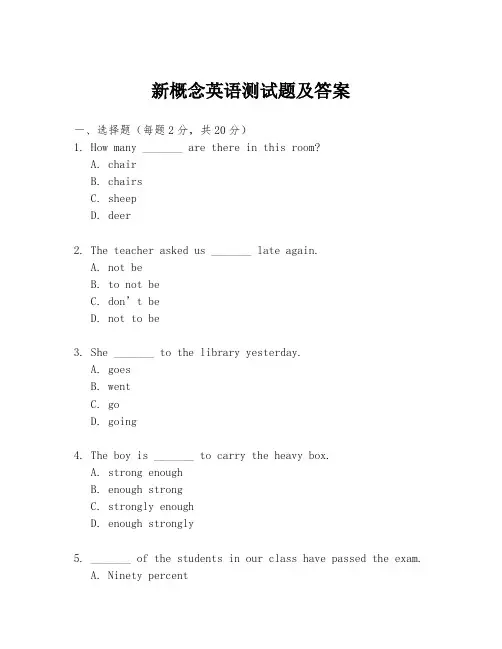
新概念英语测试题及答案一、选择题(每题2分,共20分)1. How many _______ are there in this room?A. chairB. chairsC. sheepD. deer2. The teacher asked us _______ late again.A. not beB. to not beC. don’t beD. not to be3. She _______ to the library yesterday.A. goesB. wentC. goD. going4. The boy is _______ to carry the heavy box.A. strong enoughB. enough strongC. strongly enoughD. enough strongly5. _______ of the students in our class have passed the exam.A. Ninety percentB. Ninety percentsC. The ninety percentD. Ninety percentages二、填空题(每题1分,共10分)6. If you _______ (not hurry), you will miss the bus.7. She _______ (be) a teacher since she graduated from university.8. The children _______ (play) in the park when it started to rain.9. I _______ (not see) you for a long time.10. He _______ (be) to Paris twice.三、阅读理解(每题2分,共20分)Read the following passage and answer the questions. Passage:Last weekend, I went to the countryside with my family. We stayed in a small village and enjoyed the fresh air and beautiful scenery. In the morning, we went for a walk and saw many animals, such as cows, sheep, and horses. In the afternoon, we visited a local farmer and learned about farming life. We also helped him with some farm work.11. Where did the author go last weekend?A. To the cityB. To the countrysideC. To the beachD. To the mountains12. What did the author see during the walk?A. Many buildingsB. Many animalsC. Many peopleD. Many cars13. What did the author do in the afternoon?A. They played games.B. They visited a farmer.C. They went shopping.D. They watched a movie.14. What did the author learn about?A. City lifeB. Farming lifeC. School lifeD. Working life15. What did the author help the farmer with?A. CookingB. Farm workC. CleaningD. Painting四、翻译题(每题5分,共30分)16. 请将以下句子翻译成英文:“他每天早晨都去公园跑步。
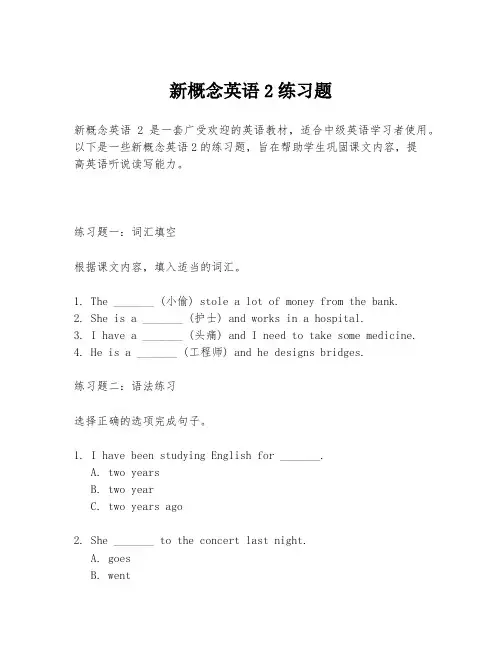
新概念英语2练习题新概念英语2是一套广受欢迎的英语教材,适合中级英语学习者使用。
以下是一些新概念英语2的练习题,旨在帮助学生巩固课文内容,提高英语听说读写能力。
练习题一:词汇填空根据课文内容,填入适当的词汇。
1. The _______ (小偷) stole a lot of money from the bank.2. She is a _______ (护士) and works in a hospital.3. I have a _______ (头痛) and I need to take some medicine.4. He is a _______ (工程师) and he designs bridges.练习题二:语法练习选择正确的选项完成句子。
1. I have been studying English for _______.A. two yearsB. two yearC. two years ago2. She _______ to the concert last night.A. goesB. wentC. go3. The children _______ in the park.A. are playingB. playC. played练习题三:阅读理解阅读以下短文,然后回答问题。
Tom is a young man who loves to travel. Last summer, he went on a trip to Australia. He visited many beautiful places, such as the Great Barrier Reef and the Sydney Opera House. He also enjoyed Australian food and made many friends there.1. What is Tom's hobby?2. Where did Tom travel last summer?3. What are some of the places he visited?练习题四:完形填空阅读下面的短文,从括号内选择合适的选项填入空白处。
新概念英语青少年版1b练习题新概念英语青少年版1b是一套专为青少年设计的英语学习教材,旨在通过各种练习题来提高学生的英语听说读写能力。
以下是一些练习题的示例:1. 词汇练习:- 根据上下文,选择正确的单词填空。
- I can't find my _______. (A) pen (B) pencil (C) book2. 语法练习:- 用括号中所给词的正确形式填空。
- She _______ (be) at the library yesterday. (was/is)3. 阅读理解:- 阅读下面的短文,然后回答问题。
- "Tom and Jerry are best friends. They both like playing football. Today, they played football in the park." - What did Tom and Jerry do today? (A) Played football (B) Watched a movie)4. 听力练习:- 听录音,然后选择正确的答案。
- What is the weather like today?- (A) Sunny (B) Rainy (C) Snowy5. 口语练习:- 根据以下情景,编写一段对话。
- 场景:两个朋友在讨论他们的周末计划。
- 学生A: Hi, what are you doing this weekend?- 学生B: (请学生填写)6. 写作练习:- 写一篇短文,描述你上个周末的活动。
- 开头:Last weekend, I...7. 综合练习:- 阅读下面的对话,然后回答问题。
- A: What time is it now?- B: It's eight o'clock.- What time did B say it was? (A) 7 o'clock (B) 8 o'clock8. 翻译练习:- 将下列句子从英语翻译成中文。
新概念英语第一册阶段复习题(01—24)一、单词辨音(0.5分/题,共5分)( )01.A.water B.bank C.have D.thank( )02.A.into B.photo C.go D.note( )03.A.film B.child C.wish D.think( )04.A.you B.touch C.country D.trouble( )05.A.music B.pupil C.student D.June( )06.A.star B.party C.warm D.March( )07.A.city B.decide C.bicycle D.clean( )08.A.headache B.chair C.teach D.change( )09.A.snow B.window C.how D.grow( )10.A.moon B.noon C.cook D.food二、根据汉译提示填空,使句意完整(1分/题,共10分)01.__________(怎样)are you today? 02.I’m very__________(好).03.That man is__________(胖). 04.That woman is__________(瘦).05.That__________(男警察)is tall. 06.__________(谁的)shirt is that?07.My shirt is__________(蓝色的). 08.__________(大概)that is Tim’s desk.09.Is your car__________(白色的)? 10.Can you__________(抓住)that ball?四、选择填空(1分/题,共10分)( )01.My coat and_____umbrella please. A.my B.your C.I D.me( )02.—Here is my ticket.—_____. A.Thanks you B.Thank you C.Thank very much ( )03.It’s a Toyota.It’s a_____car.A.AmericanB.JapaneseC.GermanD.Korean( )04.This is Alice Dupont.Alice is a_____student.A.newB.oldC.newerD.older( )05._____is your name? A.What B.How C.Which D.Where( )06.—Are you French?—_____,I_____.A.Yes/am notB.No/amC.Yes/amD.No/not( )07.—_____is Tony?—He is_____.A.What/fineB.How/wellC.What/goodD.How/good( )08.Nice_____you. A.see B.to see C.seeing D.sees( )09._____.Are you Ling Feng? A.Sorry B.Excuse me C.Hello D.Hi( )10.I’m a teacher.Are you a teacher,_____? A.please B.too C.and D.not ( )01.Tom Hanks is a very_____actor.A.prettyB.cuteC.handsomeD.smart( )02._____!Two girls are under the tree.They_____twins.A.Look/look the sameB.Look/seeC.Look/look likeD.Look/looks like( )03.She must look after those_____. A.cock B.sheep C.horse D.child ( )04.You know there are 234_____in our school.A.man teachersB.men teacherC.men teachersD.man-teachers( )05.Where are_____?A.the officer’s roomB.the room of the officersC.the officer’roomsD.the office ( )06.Ten_____is not too much money. A.dollars B.dollar C.Yuans D.pound ( )07.That girl is new in our class.Do you know_____name?A.herB.sheC.heD.his( )08.Italy is_____European country. A.a B.an C./ D.the( )09.They will build_____800-metre-long bridge(桥梁).A.aB.anC./D.one( )10.—Have you had___lunch? —Yes,I had____good dinner at my friend’s house, too.A.a/aB.your/aC.the/theD./,/( )11.There are some birds in the tree.I can’t_____them.A.lookB.look atC.watchD.find( )12.There_____5 oranges,4 pears and a peach here,but I_____bananas.A.are/likeB.is/likeC.are/amD.are/is( )13.What’s the matter_____the children?A.forB.withC.atD.to( )14.There are few___in the fridge. Let’s go and buy some peas,carrots and cabbages.A.vegetableB.fruitC.meatD.eggs( )15.Peter went camping(去野营)yesterday._____had a great time.A.SheB.HeC.TheyD.We( )16.S.H.E_____favourite group.I like them very much.A.yourB.herC.hisD.my( )17._____guitar like this?—It might be Mary’s.She plays the guitar.A.WhoseB.WhoC.WhatD.Which( )18.Tom enjoys listening to music.He has many_____.A.CDsB.clothesC.gamesics( )19.Please give_____some_____. A.I/glasses B.me/glass C. me/glasses ( )20.After the evening party, you say to your guests(客人)“_____.”A.Good eveningB.Good nightC.SorryD.I’ll be back again.五、根据句意填空(1分/题,共10分)01.My__________is Robert. 02.Nice__________meet you.03.—Are you French?—__________,I’m not. 04.—Are you German?—Yes, I_______.05.—What__________is Sophie?—She is French.06.Robert is not a__________.He is a student.07.—What is her__________?—She is a keyboard operator.08.Robert is an engineer. __________is Italian.09.Are you a keyboard operator__________an engineer?10.__________is your name?六、句型转换(1分/题,共10分)01.This is my daughter.(变为否定句)02.This is my suit.(变为一般疑问句) 03.This is Hans.(就划线部分提问)04.Robert is Italian.(就划线部分提问) 05.My name is Sophie.(就划线部分提问)06.I am number 6.(就划线部分提问)07.She is a nurse.(变为一般疑问句)08.That milkman is clean.(变为否定句)09.Are you a teacher?(作否定回答)10.Tim’s shirt is blue.(变为一般疑问句)七、用方框中的句子完成下列对话(1分/题,共10分)A:__1__,Are you Li Ming?A:My name is Jim.__3__.B:Nice to meet you, too.A:__4__.B:I am in Class 6.__5__.A:No, I am in Class 1.B:__6__. Who’s that boy?A:__7__.B:__8__.A:Yes, T-O-M, Tom.B:Thank__9__.A:__10__.三、根据下列数字写出对应的英语单词(0.5分/题,共5分)01.13__________ 02.40__________ 03.19__________ 04.80__________05.12__________ 06.99__________ 07.37__________ 08.18__________09.26__________ 10.15__________四、写出下列名词的复数形式(0.5分/题,共5分)01.friend_____ 2.officer_____ 03.passport_____ 04.orange_____ 5.tomato_____06.watch_____ 07.boss_____ 08.child_____ 09.woman_____ 10.family_____六、用复数形式改写以下句子(1分/题,共5分)01.This is my friend.02.This is his case.03.This is her hat.04.This isn’t my passport.05.This isn’t her handbag.七、改错(2分/题,共10分)01.There are some milk in the glass. 02.There is no a policeman under the tree.03.The children all are at school now. 04.Please give he the clean carpet.05.Jackie don’t likes the book on the desk.八、完形填空(1分/题,共10分)A:__1__that my car?B:__2__the number?A:__3__it’s 24.B:No,that__4__your car.Your__5__is No.28.A:Look!Is that__6__car?B:I think it is.__7__,it’s a 28 car.A:__8__very good.Oh,where__9__my bags?B:Here__10__.A:Thanks.Goodbye!B:Goodbye!( )01.A.Is B.Are C.It’s D.What’s( )02.A.How is B.Are C.What’s D.Where’s( )03.A.I think B.I don’t know C.I see D.I am( )04.A.are B.isn’t C.not D.aren’t( )05.A.are B.car C.bus D.bike( )06.A.your B.his C.my D.her( )07.A.No B.Not C.Fine D.Yes( )08.A.It’s B.It C.That D.This is( )09.A.is B./ C.am D.are( )10.A.are you B.you are C.is it D.are they。
新概念英语第一册练习题一、Multiple Choice Questions(多项选择题)1. The bookshelf __________ against the wall.A. was putB. was puttingC. has putD. have put2. He __________ as an engineer for two years.A. workedB. workC. worksD. is working3. We __________ in the library tomorrow afternoon.A. studyB. will studyC. studiesD. is studying4. He __________ the piano when I got home.A. was playingB. is playingC. playedD. has played5. They __________ lunch at 12 o'clock yesterday.A. were havingB. are havingC. hadD. has二、Fill in the blanks with suitable words(用适当的词填空)1. __________ she a doctor? No, she isn't.2. I like to play basketball, but my brother __________.3. John is not here. He __________ to the park.4. My brother is __________ about science.5. We __________ a lot of delicious food at the party.三、Rewrite the sentences(句子改写)1. His mother is a teacher.(改为一般疑问句)__________ his mother a teacher?2. They were playing soccer in the park.(改为否定句)They __________ playing soccer in the park.3. Did you receive my email yesterday?(作否定回答)No, __________.4. She has been to London twice.(改为否定句)She __________ been to London twice.5. He can play the guitar very well.(改为一般疑问句)__________ he play the guitar very well?四、Choose the correct form of the verbs(选择动词的正确形式)1. I __________ (go/went) swimming yesterday.2. They __________ (is/was) watching TV when I came home.3. She __________ (doesn't/didn't) like coffee.4. We __________ (have/had) a picnic last weekend.5. He __________ (isn't/wasn't) late for class today.五、Translate the sentences(翻译下列句子)1. 我们今天没有上数学课。
新概念英语第一册练习题pdf新概念英语第一册是一套广受欢迎的英语教材,它以生动有趣的故事和对话为基础,帮助学生学习英语。
以下是一些新概念英语第一册的练习题,供学生练习和巩固所学知识。
练习题1:词汇练习1. 将下列单词与其对应的中文意思连线。
- Apple- Dog- Cat- House- BookA. 书B. 房子C. 苹果D. 狗E. 猫2. 根据中文意思写出英文单词。
- 学校- 老师- 学生- 桌子- 椅子练习题2:语法练习1. 用括号中所给词的适当形式填空。
- She ______ (be) a teacher.- He ______ (have) a big dog.- They ______ (watch) TV every evening.2. 将下列句子变为否定句。
- I am a student.- He has a new car.- She watches TV every day.练习题3:阅读理解阅读下面的短文,然后回答问题。
Tom is a student. He has a dog and a cat. His dog is big and his cat is small. Tom likes to play with his dog and cat. He also has a book about animals. He reads it every day.1. What does Tom have?2. What does Tom like to do?3. What does Tom read every day?练习题4:完形填空Tom and his friend, Jerry, ______ (1) to the park. They______ (2) a ball and play with it. Tom ______ (3) a red cap and Jerry ______ (4) a blue cap. They ______ (5) very happy.1. A. go B. goes2. A. have B. has3. A. wear B. wears4. A. wear B. wears5. A. am B. are练习题5:写作练习根据以下提示写一篇小短文。
新概念英语初级1练习题新概念英语初级1是一套广泛使用的英语教材,适合初学者学习基础英语。
以下是一套新概念英语初级1的练习题,旨在帮助学生巩固所学知识。
练习题一:词汇匹配请将下列英语单词与对应的中文意思匹配。
1. cat2. dog3. book4. pen5. chairA. 猫B. 狗C. 书D. 钢笔E. 椅子答案:1-A, 2-B, 3-C, 4-D, 5-E练习题二:填空根据所给句子的上下文,填入适当的单词。
1. This is _______ apple.2. I have a _______ and a ruler.3. The _______ is on the table.4. _______ is a good student.A. anB. theC. He答案:1-A, 2-A, 3-B, 4-C练习题三:翻译将下列中文句子翻译成英文。
1. 这是我的书包。
2. 你叫什么名字?3. 他有一个大苹果。
4. 她正在看书。
答案:1. This is my schoolbag.2. What's your name?3. He has a big apple.4. She is reading a book.练习题四:完形填空阅读下面的短文,并从括号中选择适当的词填空。
In the morning, I (1) (get up, got up) at six o'clock. I (2) (brush, brushed) my teeth and (3) (wash, washed) my face.Then I (4) (have, had) breakfast. After that, I (5) (go, went) to school.答案:1-got up, 2-brushed, 3-washed, 4-had, 5-went练习题五:阅读理解阅读下面的短文,并回答问题。
新概念英语第一册练习题(打印版)一、词汇练习1. 根据上下文,选择正确的单词填入空白处。
- My brother is very good at (playing/reads) the guitar. - She likes to (sing/sings) when she is happy.2. 将下列单词转换为第三人称单数形式。
- Have → ________- Go → ________- Do → ________二、语法练习1. 将下列句子变为一般疑问句,并给出肯定和否定回答。
- She is a teacher.- They are at school.2. 将下列句子变为现在进行时态。
- She works in a bank.- We have dinner at seven.三、阅读理解阅读下面的短文,然后回答下列问题。
Tom is a student. He is twelve years old. He has a sister. Her name is Ann. Ann is a student, too. She is ten. Tom andAnn are in the same school. They like school very much. They have lunch at school. They go home at four o'clock.1. How old is Tom?2. What does Tom and Ann like to do?3. When do they go home?四、完形填空Tom is a good boy. He always (1) ______ early in the morning. He (2) ______ his teeth and (3) ______ breakfast. Then he (4) ______ to school. He (5) ______ his homework at school. He (6) ______ his friends after school. He (7) ______ TV in the evening. He (8) ______ to bed at nine o'clock.1. A) gets up B) gets2. A) brushes B) brush3. A) has B) have4. A) goes B) go5. A) does B) do6. A) meets B) meet7. A) watches B) watch8. A) goes B) go五、翻译练习将下列句子翻译成英文。
Unit1How does one "save face" or "lose face" This concept is in fact for different peoples throughout the world and is not 1. ( )Chinese. It could also be considered a Western 2.(). However, it carries much weight for Asian people and its 3.() in Asian countries is greater.Some Asian people believe that the 4. ( )of "face" and other rituals and 5. ( )like honoring your parents do not 6. ( )in the West, but it would be too 7.() to put it in this way. When we 8.()the values held by families in the West, we find that many have similar beliefs to 9.()that guide Asian culture, and they 10.them in their daily lives. So, some ideas are becoming 11.() similar between the east and west. For example, American students are having a stronger 12.()of studying hard for the honor of their families than before. And American people are more concerned about the disadvantages of "happy education" for primary education than they 13.().One major 14.()is how each weighs an 15.() rights against the rights of the community. There are people, 16.(), and even leaders in the West who believe that the freedom of an individual carries much more 17.() than needs for the order in the community. 18.() Americans hold the right to own a gun so dear that they have consequently been willing to 19.() a blind eye to the harm that people 20.() guns has caused.A proper balance between Western and Eastern ideas can be a very good idea.答案;1entirely 2convention 3significance 4principles 5customs 6exist 7absolute 8assess 9those 10practice 11increasingly 12consciousness 13used to be 14difference 15individual's 16communities 17weight 18Some 19turn 20obtaining阅读理解:I used to go to Starbucks (星巴克) for their coffee, but that's changed since I discovered their comforting, tasty teas, which are better than coffee any time. Tea is cool even when it's hot. People drink more tea than any other drink in the world, except for water. Whether it's served hot or cold, natural and flavored teas are drinks that have been consumed (消费) for centuries. Everywhere you look, you'll find various kinds of teas―in restaurants, grocery stores, television advertisements, and gift shops.Why is there all this excitement about tea What's its attraction Well, there are many possibilities for why more and more people are drinking tea. One possibility is that people are coming to notice the benefits of drinking tea, particularly green tea. Studies show that drinking four cups of green tea a day can reduce the risk of developing various types of cancer, as well as heart disease. The key to tea's effects of cure seems to lie in chemicals found in tea which prevent a process that leads to the growth of cancers. Green tea may also prevent skin cancer. It has also been linked with helping the body to rid itself of harmful materials, and green tea is thought to possibly protect against colds and Parkinson's (帕金森) disease.Another explanation for why people are drinking more tea may be due to the comforting process of just making a cup of tea. The time it takes to prepare tea leaves in hot water and enjoy its gentle flavor forces drinkers to slow down and relax a while, making it the perfect way to improve a world where people are so crazy about cappuccino(热牛奶咖啡), a hot coffee with milk in it.So, whether you drink tea, eat it in foods, wear it to smell good, or take it in pills, one thing is certain, the use of tea is more than a trend―it is a habit of our past and if studies prove the benefit of its use, it will undoubtedly be an important element of our future.1.Nowadays, among all the drinks in the world, tea is __________.A. the most widely consumed drinkB. as widespread as coffeeC. even more widely consumed than waterD. the second most widely consumed drink2.The passage does not mention __________ as a possible benefit of drinking tea.A. preventing skin cancerB. helping the body to rid itself of harmful materialC. curing Parkinson's diseaseD. reducing the risk of developing cancer3.It is good to drink tea because the time it takes to prepare a cup of tea _________.A. allows the tea leaves to absorb enough waterB. enables drinkers to relaxC. is suitable for people to get some newsD. can improve the quality of cappuccino4.The writer suggests that in the future people will probably ___________.A. follow the trend and go on drinking teaB. drink more water than teaC. form the habit of eating tea leaves in foodsD. take tea as an important part of their life5.The passage is mainly about ____________.A. the benefits of drinking teaB. the benefits of drinking coffeeC. using tea leaves in fortune tellingD. advising people to drink tea and waterUnit3Do high divorce rates in countries like England and the United States indicate that marriage is no longer a life-long 1.() Have we lowered our 2.() for marriage Some suspect that it is the temporary nature ofthings in our life that has 3.()to high rates of divorce. We change jobs 4.() we change our socks, and make new friends each time we move, 5.() is often. Divorce is a 6.() result in such a social environment.7.(), divorce is becoming the norm for the next 8.(). Now there is much less 9.() from children for their parents to divorce than before. It seems that the idea of marriage commitment of staying together until death is quietly 10().. 11.() the children of divorced parents learn to 12.()divorce more readily Or is it a matter of learning from their parents how to make a marriage 13.() Most people still have 14.() about divorce when children are involved. Many wait until their children have grown and have 15.()the home to get a divorce.Nowadays, people across the globe see 16.() in an unhappy marriage as 17.()than getting a divorce. One 18.()is some women, who would have previously 19.() hardship while married, now have enough education and money to be able to 20.() outside of marriage. There is a real formula for change.答案:1 commitment 2expectations 3led 4as often as 5which 6subsequent 7Moreover 8generation 9resistance 10passing away 11Do 12accept 13work 14reservations 15left 16staying 17worse 18factor 19suffered 20survive阅读理解:In the United States 84 colleges now accept just women. Most of these colleges were established in the 19th century; they were designed to offer women the education they could not receive anywhere else. At that time major universities and colleges acceptedonly men. In the past 20 years many young women have chosen to study at colleges that accept both men and women. As a result some women's colleges decided to accept men students too. Others, however, refused to change. Now these schools are popular (流行的) again.The president of Trinity College (三一大学) in Washington, . said that by the end of the 1980s women began to recognize that studying at the same school with men did not mean women were having an equal chance to learn. The president of Smith College in Massachusetts says a women's college permits women to choose classes and activities freely. For example, she says that in a women's college a higher percentage of students studies mathematics than in a college with both men and women.Educational experts say men students in the United States usually speak in class more than women students do. In a women's college, women feel freer to say what they think. Women's schools also bring out leadership capabilities in many women. Women are represented everywhere. For example, at a women's college every governing office is held by a woman. Recent studies reportedly show that this leadership continues after college. American women who went to women's colleges are more likely to hold successful jobs later in life.1.Women's colleges were established to ________________.A. give women the same right of education that men enjoyB. make changes to the traditional educational system (系统)C. defy men's privilege (特权) in societyD. train women in particular fields2.Studying at the same school with men does not mean ________________.A. women can do the same thing as menB. that women are given the same chance as menC. women are allowed more freedom to develop themselvesD. the present educational system does not allow other choices3.According to the passage, in women's schools _________________.A. women are freer than if they study at the same school with menB. women could do anything they wantC. they teach things peculiar to womenD. men are openly challenged4.Which one of the following statements is NOT true about women's collegeA. Women feel freer to say what they think.B. More women can participate in the management of the college.C. A very high percentage of women will become leaders later.D. Women are more likely to be successful in their later careers.5.The title of this passage is most likely to be ______.A. Female Education in the United StatesB. Women's Schools in the United StatesC. Women Should be Given the Same Education as MenD. Education in AmericaUnit5"Mommy, do you love me" asked Cleo during dinner that evening."Of course I do," Her mother replied 1.()what was next. "Mommy do you love me" usually 2.() her daughter wanted something."Then why don't you ever want to play with me"Mrs. Nelson was a single mother trying to 3.()her daughter by herself. She worked fifty hours a week at a job and 4.()to cover the costs of their home. This didn't 5.() the two hours of driving between the office and home. She was gone by 7 a.m. and back around 7 pm, just 6.() to cook a late dinner for her and her daughter and 7.() her daughter to bed. On the weekends, the house was usually so unclean that she spent most of her time 8. ( )it up, doing the wash and 9.() in the kitchen. When she was finished with that, she hardly had any 10. ( )for anything else.Mrs. Nelson understood that she had not been giving her daughter the 11. of time that she needed, but she didn't know 12. ( )to do. She felt so guilty and so 13.() to change her situation. She was also greatly angry with Cleo's father for 14.() them in this situation. She tried to smile at her daughter and give her some type of 15.()for the following weekend, but 16.()she started to cry. She got up from the table and went to the bathroom to 17.()water on her face and then returned to the table where her daughter was still eating. Cleo looked 18.(); 19.(), she hadn't said anything that she thought was hurtful."I'm sorry, Cleo," her mother said without further explanation. "How would you like to go to the zoo next Sunday" Cleo's face 20.() up. Mrs. Nelson knew that her situation wasn't going to improve anytime soon, but feeling depressed in front of her daughter wasn't going to do anything to improve the situation.答案1wondering2meant3raise4managed5include6in time7put8straightening9cleaning up10energy11amount12what else13helpless14having left15promise 16instead17splash18confused19after all20brightened阅读理解:If you want to stay young, sit down and have a good think. This is the research finding of a team of Japanese doctors, who say that most of our brains are not getting enough exercise and as a result, we are aging unnecessarily soon.Professor Taiju Matsuzawa wanted to find out why otherwise healthy farmers in northern Japan appeared to be losing their ability to think and reason at a relatively early age, and how the process of aging could be slowed down.With a team of colleagues (同事) at Tokyo National University, he set about measuring brain activity of a thousand people of different ages and varying (不同的) jobs. Computer technology enabled the researchers to obtain precise measurements of the activity of the front and side sections of the brain, which relate to intelligence and feeling, and determine the human character. (The rear section of the brain, which controls functions like eating and breathing, does not change with age, and one can continue living without the ability to think and feel.)Change of front and side parts, as bits die off, was observed in some subjects in their thirties, but it was still not to be seen in some sixty-and-seventy-year-olds. Matsuzawa discovered from his tests that there is a simple answer to the loss normally associated with ageusing the head.The findings show in general terms that the decrease of the brain's ability to think begins sooner in people in the country than in the towns. Those least at risk, says Matsuzawa, are lawyers, followed by university professors and doctors. White-collar workers doing routine work in government offices are, however, as likely to have shrinking brains as the farm worker, bus driver and shop assistant.Matsuzawa's findings show that thinking can prevent the brain from shrinking. Blood must move around properly in the head to supply the fresh oxygen the brain needs. "The best way to keep blood moving well is through using the brain." He says, "Think hard and engage in conversation. Don't rely on pocket calculators."1.The team of doctors wanted to find out _________________________.A. why certain people age sooner than othersB. how to make people live longerC. the size of certain people's brainsD. which people are most intelligent2.Which of the following statements is trueA. People who work in the government don't age as quickly as people in the town.B. The back of the brain is in charge of people's eating.C. The easiest way to prevent the brain from aging is to improve our diet.D. We are young when we have enough physical exercise.3.The doctor's tests show that _____________________________.A. our brains shrink as we grow olderB. the front section of the brain does not shrinkC. sixty-year-olds have better brains than thirty-year-oldsD. some people's brains less active than other people's4.According to the passage, which group of people seem to age sooner than the othersA. Lawyers.B. Professors.C. Doctors.D. White-collar workers.5.The article is possibly written for ________________________.A. junior studentsB. ordinary readersC. doctors and nurses in hospitalsD. university professorsUnit6完形填空When I was younger, I was 1.() to wear my hair short as it said you wanted to join the army and 2.()the actions of the military. As nothing could have been 3.()from the truth, I made sure my hair never looked as if I was 4.() the military. However, I did not 5.() want what the average citizen thought was an appropriate 6.().I needed to say that I wasn't like them by looking more 7.(), so I grew my hair long. But what I 8.() about myself and the other long-haired men was that we were all trying to say that "we didn't 9.()". What I also noticed was that other than having long hair, we 10.()doing anything that was very impressive. I decided then that I no longer wanted to make a 11.() by wearing my hair a certain way. I chose a(n) 12. cut that tried not to say anything. My hair was short, but not to the 13. that it carried the label, "supporter of military operations". I kept my hair that way for a couple of years, but I still wasn't satisfied. My hair was still long enough that it could be 14.in different ways to reflect my willingness to be like the others. It could also be combed 15. where I was losing my hair. Again, I felt like my hair was 16. me. There was only one thing to do. I had my hair shaved really short which showed exactly where I was 17. it. My head felt cold and I kept on 18. it; but at least I had passed the 19. age for someone in the military, so no one would 20. a 30-something man with hair loss for a want-to-be soldier.答案:1afraid 2supported 3further 4joining 5necessarily 6appearance 7remarkable 8noticed 9belong 10weren't 11statement 12average 13extent 14styled 15to hide 16misrepresenting 17losing 18rubbing 19characteristic 20confuse阅读理解:In 1848, gold was discovered in California; from all over the nation, thousands of young men set out for California. People called this the time of the Gold Rush.A gold miner came into a city looking for a pair of pants. He wanted pants strong enough to stand up to the rough work of mining. He met a young man named Levi, who sold heavy cloth for tents and wagon tops. They asked a tailor to use heavy cloth for their pants. Then Levi went into the business of making work pants. He asked his brothers to send him some strong blue cotton cloth called denim (斜纹粗棉布). With this blue denim cloth, Levi started making the kind of pants we call blue jeans today. They were sewed up in the same way as other pants.In 1860, a miner said that the pockets weren't strong enough to hold the pieces of gold he found. The pockets kept falling off the pants. The cloth was all right. It was the thread that wasn't strong enough. So Levi used rivets (铆钉) to attach the pockets onto the pants.Cowboys needed tough pants, too. They liked their pants to fit tightly. But the rivets marked the cowboys' saddles. So Levi covered the rivets with cloth. Then everybody was happy.1.This article as a whole is about __________________.A. how people got blue jeansB. the Gold Rush in CaliforniaC. How blue jeans are madeD. The kind of pants cowboys' wear2.While not stated in the article, you can tell that __________________.A. everybody who went to California got a lot of goldB. Levi found riches in the gold fieldsC. Levi sold more jeans to cowboys than to gold minersD. Levi made more money than many gold miners3.The word this in the last sentence of the first paragraph refers to ___________.A. CaliforniaB. the discovery of goldC. many people looking for goldD. the nation at this time4. Levi used strong blue cotton cloth to make pants because __________.A. gold miners liked the blue colorB. this was the only cloth he hadC. miners wanted pants which could stand rough workD. cowboys liked their pants to fit tightly5. Which of the following sentences is NOT trueA. It was Levi who started the business of making blue jeans.B. It was one tailor who started making blue jeans.C. It was in California that blue jeans first became popular.D. It was inCalifornia that gold was discovered. 二、Since the late 1960s a growing number of women have expressed a strong dissatisfaction with any marriage arrangement in which the husband and his career are the most important considerations in the marriage. By the end of the 1970s, for example, considerably less than half of the women in the United States still believed that they would put their husbands and children ahead of their own careers.More and more American women have come to believe that they should be equal partners in their marriages. This stage of marriage, although still unusual in most American marriages at present, will grow most rapidly in the future. In an equal marriage, the wife gets a full-time job or career which has equal importance to her husband's. The long-standing division of labor between husband and wife comes to an end. The husband is no longer the main provider of family income, and the wife no longer has the main responsibilities for household duties and raising children. Husband and wife share all these duties equally. Power over family decisions is also shared equally.The rapid change in women's attitudes toward marriage in the 1970s reflected the rapid changes in the larger society. The Women's Liberation Movement appeared in the late 1960s,demanding an end to all forms of prejudice against females. An Equal Rights Amendment (修正案) to the US Constitution was proposed which would make any form of prejudice on the basis of sex illegal, and though it has failed to be confirmed, it continues to have millions of supporters.6.Since the late 1960s more women have been dissatisfied with the marriage in which __________________.A. they are unhappyB. they are in a lower positionC. only the husband earns moneyD. the wife only takes care of the household7.What is the long-standing division of labor between husband and wife in AmericaA. Husband―provider, wife―domestic duties.B. Husband and wife share the housework.C. Husband and wife have equal responsibility.D. Husband plays a higher role than the wife8.Which statement is NOT true about the new type of marriageA. Husband and wife share all their duties equally.B. Wife can also make the decisions in the family.C. Wife earns their living while husband does the housework.D. Husband is also responsible for raising children.9.Women's attitudes toward marriage involve ____________________.A. the Women's Liberation MovementB. forbidding any form of prejudice against womenC. the changing roles of husband and wife in the marriageD. all of the above10.Which of the following describes the general idea for this passageA. The Changing Patterns of Americans' Marriage.B. An Ideal Marriage.C. The Women's Liberation Movement.D. The need for Equal Rights between Husband and Wife.Unit7There should be a big distinction between working hard and being a workaholic. Working hard 1.() being organized, getting a lot of work done. Workaholics, on the other hand, are often disorganized, have 2.()lives.However, the whole idea of "take it easy" 3.() us Americans. The last thing I want to hear is someone trying to help me by telling me to " 4.()." From my viewpoint, it's like a 5.() to see who can look the most calm. I have taken care not to 6.() myself. Never give myself impossible things, but only things that will 7. ( )my identity. I 8. ( )on discussing the problems with my friends to see how I can 9.()the pressure. I don't smoke, overeat, get 10.(), or eat much red meat. I have hobbies and I have relatively low blood 11.(), exercise regularly, and have a low 12.() of cholesterol.For some people, there is no desire to 13.()anything meaningful in life. Hard work has been 14.(). Relaxing is becoming a 15. ( )habit for Americans. 16.(), there should be more 17. ( )on getting something meaningful done once in a while.I'm much more willing to be 18.() and die 19.() sooner than to take it easy. I 20.()that we get off the couch and start relaxing a little less. A little stress might be the outlet we need.答案:1involves 2unbalanced 3overwhelms 4relax 5competition 6overwork 7affect 8insist 9reduce 10drunk 11pressure 12level 13accomplish 14neglected 15troublesome 16Undoubtedly 17analysis 18stimulated 19very 20recommend阅读理解:Open or distance learning has had a major effect on higher education through the Open University, the only university to provide education exclusively for adult learners studying at a distance. Our 100,000 students are currently studying at the Open University. We found limited development of distance learning in the case studies, with the exception of some postgraduate and professional courses. Even here, however, there seemed to be limits on further growth because of the high costs involved in setting up new distance learning courses, as well as uncertainties of demand (particularly in terms of the perceived financial returns on study). One of the case study universities provided video facilities and visiting staff to a rural area for a group of undergraduate (大学本科在校的) students about 50 miles away. This was a new development which was working well and likely to be expanded to involve other universities.The main reason for general lack of development of distance learning, especially at the undergraduate level, may be that other universities have been unable to afford the considerable set-up costs and student support facilities. As costs of technology come down this might change. The Open Learning Foundation is developing connections between universities to set open learning approaches within existing programs of study and thus encourage their greater use. This is seen as likely to develop further in the future.1.The Open University provides an education for _________________.A. students who do not like attending regular universitiesB. students who failed the College Entrance ExaminationC. students who are adults and away from a universityD. students who are limited in their ability to learn2.Among other things, the further growth of distance learning at postgraduate and professional levels is limited by ____________________.A. the high costs involvedB. a low student demandC. a lack of educationD. the poor rural technology3.The attempt of one case study university to provide equipment and staff to a rural group of students _________.A. would be expandedB. did not work wellC. might help learningD. could cost a lot4.The cost of setting up a distance learning program might change ______________.A. as new developments are madeB. as more students take classes thereC. as the Open University helps moreD. as technology becomes cheaper5.The tone of this passage can best be described as ________________.A. discouragingB. encouragingC. persuasiveD. scientificUnit8What is the meaning of life I am sitting alone in a corner in an unremarkable little house in the dark to 1.()my brains for an answer. I am 2.(). I have just 3.()my job and my husband has recently left me. I am 35 years old.It is 4.()that the meaning of life is to do what you are told 5.()you are about25 years old and then to marry who you are told to marry. If you are 6.(), there isa brief period of being in love before 7.()your relatives or your husband tells you that it is your 8.()to get pregnant and have children. You may have had a(n) 9.() career with a good salary, but that is about to end. Your children will 10.()constant attention and you will be 11.()a housewife. You will recognize that your youth has passed and begin to grow old. 12.(), your husband will leave you for someone younger. My services as a wife are 13.()required.The whole question 14.()me for a moment. How did I get to this point I am not 15.() that I can say that I have ever made a major 16.()on my own. I start to get depressed, but then I am 17.() by something quite curious: freedom. There is no one 18.()me what to do. I am no longer 19.() by the wisdom of my parents. I realize that my ambition had been to have a(n) 20.()and freedom, not a husband and a stay-at-home lifestyle. The infinite possibilities excite me.答案:1rack 2depressed 3lost 4eviden t5until 6fortunate 7either 8duty 9promising 10demand 11rendered 12Accordingly 13no longer 14puzzles 15certain16definition 17struck 18to speak 19confined 20occupation阅读理解:A man was telling one of his friends why he was content with his married life. "My wife makes all the small decisions," he explained, "and I make all the big ones, so we never try to have too much influence on each other's business and never get angry with each other. We have no complaints and no arguments.""That sounds reasonable," answered his friend. "And what sort of decisions does your wife make""Well," answered the man, "she decides what jobs I apply for, what sort of house we live in, what furniture we have, where we go for our holidays, and things like that."His friend was surprised. "Oh" he said. "And what do you consider important decisions then""Well," answered the man, "I decide who should be President, whether we should increase our help to poor countries, what we should do about the atom bomb (原子弹), and things like that."。